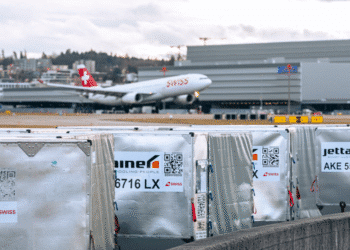Forwarders call on TSA to work with air cargo industry on rule change
AirCargo 2023
NASHVILLE, Tenn. — Forwarders are calling on the U.S. Transportation Security Administration (TSA) to work with the air cargo industry on amendments to the TSA Certified Cargo Standard Security Screening Program (CCSSSP) that expire in October.
The amendments due to expire create exemptions for impractical-to-screen cargo.

The “industry needs TSA’s strong support in messaging the shippers that the CCSSSP … is the only realistic available option to continue to move their cargo,” Brandon Fried, executive director of the Airforwarders Association (AfA), said in a statement.
In keeping with European Union Aviation Safety Agency (EASA) and International Civil Aviation Organization (ICAO) policy, Congress years ago directed TSA to establish cargo-screening regulations, and a program creating procedures to screen cargo before each flight took effect in 2010.
The rules allowed exemptions for cargo deemed “impractical to screen,” including engines, items shipped in oil drums and other cargo that could fail K-9 screening for explosives due to their manufacturing processes and proximity to chemicals although they are not dangerous in nature. For such shipments, technology and other security measures were instituted to ensure safety.
The TSA did not respond to requests for comment by press time.
Lack of clarity
The TSA has not worked with freight forwarder sregarding the upcoming amendment expiration, John Beckius, executive director of TSA’s Air Cargo Division, said during At AfA’s annual meeting at AirCargo 2023.
Freight forwarder Rock-It Global was among the companies calling for increased TSA communication on the rule change, with Chief Administrative Officer Sasha Goodman saying that she learned of the rule change last fall.
“Screening is not a forwarder requirement; it is really an air carrier requirement, but we don’t work in isolation, so of course there are implications for us all,” she told Air Cargo Next.
“Notification came through in 2022 but there was a lack of clarity,” Goodman said, adding that the cost to screen cargo would be passed on to end users.
“I think it is short-sighted and we should be collaborating. Stakeholders from all sides should be brought to the table,” she said. “Not doing so can only lead to confusion, freight rejection by airlines and general reduction in cargo efficiency.”
Freight rejection would cause certain items that cannot be screened to be passed to maritime shipping, according to Goodman.
“The shipper and the [indirect air carrier] are harmed as they face a situation where they won’t be able get their product exported by air,” she said.
TSA communication lacking, former official says
Douglas Brittin, former director of the Air Cargo Security Division at the TSA, told Air Cargo Next the TSA isn’t equipped to communicate its rule effectively.
“Currently, TSA does not have that level of resources,” said Brittin, a founder of consulting firm Brittin Aviation Associates. “So, as a result, their efforts or ability to go out and work with industry to notify the shippers about the reality of this is lacking.”
Shippers would be hurt the most by the requirement for 100% screening. Brittin said, adding, “It really comes down to that small subset of shippers who have these products that are very difficult to screen.”





